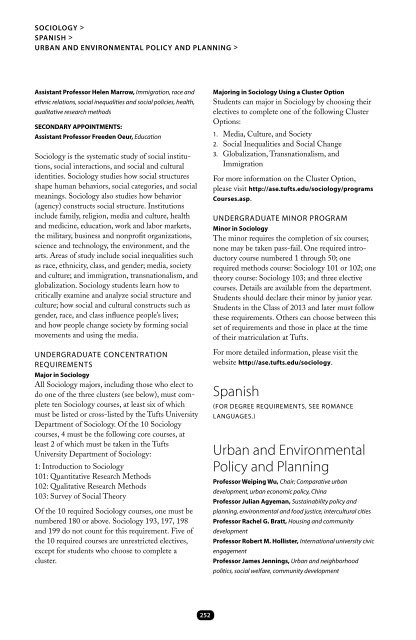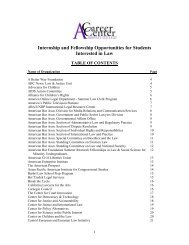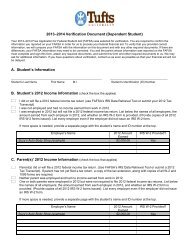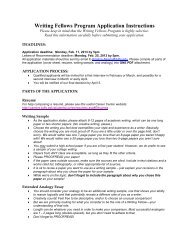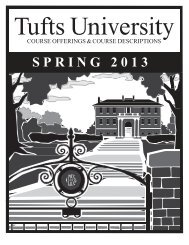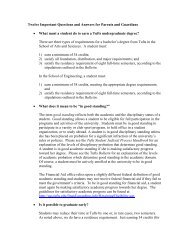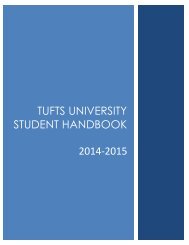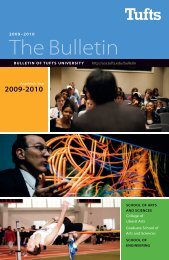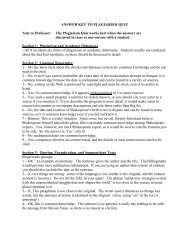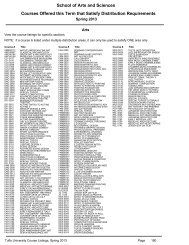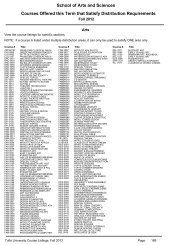2013â2014 The Bulletin - USS at Tufts - Tufts University
2013â2014 The Bulletin - USS at Tufts - Tufts University
2013â2014 The Bulletin - USS at Tufts - Tufts University
Create successful ePaper yourself
Turn your PDF publications into a flip-book with our unique Google optimized e-Paper software.
Sociology ><br />
Spanish ><br />
Urban and Environmental Policy and Planning ><br />
Assistant Professor Helen Marrow, Immigr<strong>at</strong>ion, race and<br />
ethnic rel<strong>at</strong>ions, social inequalities and social policies, health,<br />
qualit<strong>at</strong>ive research methods<br />
SECONDARY APPOINTMENTS:<br />
Assistant Professor Freeden Oeur, Educ<strong>at</strong>ion<br />
Sociology is the system<strong>at</strong>ic study of social institutions,<br />
social interactions, and social and cultural<br />
identities. Sociology studies how social structures<br />
shape human behaviors, social c<strong>at</strong>egories, and social<br />
meanings. Sociology also studies how behavior<br />
(agency) constructs social structure. Institutions<br />
include family, religion, media and culture, health<br />
and medicine, educ<strong>at</strong>ion, work and labor markets,<br />
the military, business and nonprofit organiz<strong>at</strong>ions,<br />
science and technology, the environment, and the<br />
arts. Areas of study include social inequalities such<br />
as race, ethnicity, class, and gender; media, society<br />
and culture; and immigr<strong>at</strong>ion, transn<strong>at</strong>ionalism, and<br />
globaliz<strong>at</strong>ion. Sociology students learn how to<br />
critically examine and analyze social structure and<br />
culture; how social and cultural constructs such as<br />
gender, race, and class influence people’s lives;<br />
and how people change society by forming social<br />
movements and using the media.<br />
UNDERGRADUATE concentrATION<br />
REQUIREMENTS<br />
Major in Sociology<br />
All Sociology majors, including those who elect to<br />
do one of the three clusters (see below), must complete<br />
ten Sociology courses, <strong>at</strong> least six of which<br />
must be listed or cross-listed by the <strong>Tufts</strong> <strong>University</strong><br />
Department of Sociology. Of the 10 Sociology<br />
courses, 4 must be the following core courses, <strong>at</strong><br />
least 2 of which must be taken in the <strong>Tufts</strong><br />
<strong>University</strong> Department of Sociology:<br />
1: Introduction to Sociology<br />
101: Quantit<strong>at</strong>ive Research Methods<br />
102: Qualit<strong>at</strong>ive Research Methods<br />
103: Survey of Social <strong>The</strong>ory<br />
Of the 10 required Sociology courses, one must be<br />
numbered 180 or above. Sociology 193, 197, 198<br />
and 199 do not count for this requirement. Five of<br />
the 10 required courses are unrestricted electives,<br />
except for students who choose to complete a<br />
cluster.<br />
Majoring in Sociology Using a Cluster Option<br />
Students can major in Sociology by choosing their<br />
electives to complete one of the following Cluster<br />
Options:<br />
1. Media, Culture, and Society<br />
2. Social Inequalities and Social Change<br />
3. Globaliz<strong>at</strong>ion, Transn<strong>at</strong>ionalism, and<br />
Immigr<strong>at</strong>ion<br />
For more inform<strong>at</strong>ion on the Cluster Option,<br />
please visit http://ase.tufts.edu/sociology/programs<br />
Courses.asp.<br />
UNDERGRADUATE MINOR ProgrAM<br />
Minor in Sociology<br />
<strong>The</strong> minor requires the completion of six courses;<br />
none may be taken pass-fail. One required introductory<br />
course numbered 1 through 50; one<br />
required methods course: Sociology 101 or 102; one<br />
theory course: Sociology 103; and three elective<br />
courses. Details are available from the department.<br />
Students should declare their minor by junior year.<br />
Students in the Class of 2013 and l<strong>at</strong>er must follow<br />
these requirements. Others can choose between this<br />
set of requirements and those in place <strong>at</strong> the time<br />
of their m<strong>at</strong>ricul<strong>at</strong>ion <strong>at</strong> <strong>Tufts</strong>.<br />
For more detailed inform<strong>at</strong>ion, please visit the<br />
website http://ase.tufts.edu/sociology.<br />
Spanish<br />
(FOR DEGREE REQUIREMENTS, SEE roMANCE<br />
LANGUAGES.)<br />
Urban and Environmental<br />
Policy and Planning<br />
Professor Weiping Wu, Chair; Compar<strong>at</strong>ive urban<br />
development, urban economic policy, China<br />
Professor Julian Agyeman, Sustainability policy and<br />
planning, environmental and food justice, intercultural cities<br />
Professor Rachel G. Br<strong>at</strong>t, Housing and community<br />
development<br />
Professor Robert M. Hollister, Intern<strong>at</strong>ional university civic<br />
engagement<br />
Professor James Jennings, Urban and neighborhood<br />
politics, social welfare, community development<br />
252


